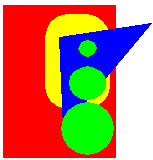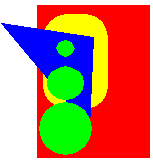



A pattern describes a family of solutions to a recurring problem. Patterns form larger wholes like pattern languages, systems or handbooks when woven together to provide guidance for solving complex problem sets. Patterns express the understanding gained from practice in software design and construction. Writing them is a good way to deepen, to structure, and to pass on the system skills we build up and call `experience' or even `intuition'.
All aspects of software systems, including their development and their deployment, are suitable topics for individual patterns or comprehensive pattern languages. Patterns might be so specific as to name particular objects, their responsibilities, and interaction. A well-known pattern of this kind is, for example, the Observer pattern from the Design Patterns: Elements of Reusaable Object Oriented Design by the `Gang-of-Four'. It supports keeping co-operating components consistent, with a change propagation mechanism. Patterns can also describe configurations of software, or even people. An example for the latter are James O. Coplien's organizational and process patterns found in Chapter 13 of Pattern languages of Program Design. They help with organizing productive software development teams.
Pattern Languages of Programming (PLoP) events are opportunities for pattern authors to have their pattern languages critically reviewed by fellow authors. This criticism is offered in the form of Writer's Workshops. This feedback allows the participants to improve their patterns to make them more useful or more publishable.
There is no guaranteed publication associated with the review of a pattern language at PLoP. In the past, selected papers have appeared in the Pattern Language of Program Design (PLoPD) series. Each pattern paper that is reviewed at PLoP might be placed in a pool that is drawn from to populate future PLOPD books, but it might not be for several years.
There are a number of PLoP events:
Each of these has a slightly different focus. UP is about using patterns and offers sessions addressing reading patterns, ways to use patterns, etc. EuroPLoP offers a non-USA venue for the workshoping of patterns as well as some introductory topics, such as proto-pattern workshops. ChiliPLoP, will host introductory pattern sessions as well as intense discussion on hot topics.
PLoP/Allerton Park 1997 focuses on offering pattern authors the best writer's workshops for their pattern languages, as well as information that will help them become more effective pattern authors. PLoP/Allerton Park will also provide activities for pattern authors (and other attendees) to expand their thinking about patterns and pattern languages.
There will be time for informal BoF sessions, announced on-site by any attendee. These are informal forums to discuss anything, possibly not related to patterns.
There are no plans for traditional style paper presentations or experience reports at PLoP. Both UP and EuroPLoP provide forums for reports of experiences using patterns.
PLoP is a little different than most conferences or workshops. This page talks about some of the things you can expect if you attend PLoP.
Papers are sought for PLoP/Allerton Park.
Concrete patterns for programming, design, analysis
and modeling, organizing the development process, system deployment and
maintenance are desired. Domain specific patterns, such as for
telecommunications or business systems are welcome.
Individual patterns, as well as pattern languages are welcome.
The actual subjects of patterns
need not be original.
Rather, preference will be shown to authors best
able to exploit the pattern form in the field of computing.
Papers
to be workshoped at PLoP must be of a manageable size. For
submissions longer than 15 pages, authors will be expected to work
out some criteria with their shepherds to make the task of sheperding and
workshoping possible. These criteria might include limiting
discussion to a set of
patterns, or deciding that the focus of discussion should be how the
overall collection of patterns works together rather than any individual
patterns.
The emphasis of PLoP/Allerton Park - 1997, and hence the preference of the
selection committee is for patterns that exhibit these principles:
"The patterns that I have written with the broadest impact
were the ones that I was tempted not to publish because everyone
knows that." - Kent Beck
Patterns are applied by the means of piecemeal growth.
Applying one pattern provides a context for the application of
the next pattern.
In order for this to work, elementary patterns must be written
to provide the stepping stones to allow the novice into the process.
If your pattern language builds upon more elementary patterns
that haven't yet been written, ask yourself why they haven't been
written yet? Because they are obvious? Because they are trivial?
Are they really obvious and trivial, even to someone not as skilled
in your domain?
Consider writing a pattern language that contains the elementary
patterns to get the novice started in a new domain. Patterns
are about celebrating an "aggressive disregard for originality",
and documenting proven solutions, not current research.
Use PLoP as a place to improve your pattern writing,
not with advanced topics, but with the elementary results.
Advanced patterns are useful only to those who already know them,
unless a suitable foundation of elementary patterns has been established.
Authors should submit an electronic copy of their paper, in
English by June 9, 1997 to
r.s.hanmer@lucent.com.
Submissions must be in either Postscript or PDF formats.
Submissions should not exceed 15 pages. (For longer submissions, refer to
the discussion above.)
They must be prefaced with ASCII
text containing:
If the submission represents work that is primarily meant to be represented
as a Web based document, a URL may be specified instead of a Postcript (or
PDF) file. A Postscript (or PDF) file will be required of all accepted
works in preparation for the actual conference.
The final versions of accepted papers must be received must be received
in either Postscript or PDF by August 18, 1997.
It is possible that a hardcopy from the
author's printer will be requested, if we are unable to print an
usable copy. These will then be
assembled into the preliminary proceedings for the Writer's Workshops.
No further changes will be accepted before the conference.
![]()
![]()
Call For Papers
Preferences
Piecemeal Growth
![]()
![]()
Submitting Patterns to PLoP
Shepherding
Selection
Publications
![]()
![]()
Location

This site is home to native flood-plain forest and upland woods, as well as
numerous formal gardens. The manor house, modeled after the Ham House in
England, was built in 1900.